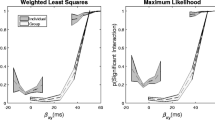Abstract
The current study describes a trial-based functional analysis of problem behavior conducted in a home setting for a 7-year-old girl with autism. Problem behavior was occasioned by interruptions to an ongoing activity. Advance notice, in the form of a 2-min warning, and the sound of a timer were used to signal termination of a current activity and were effective at reducing problem behavior along with increasing compliance to the interruptive demands. A trial-based functional analysis, which are not common in the applied literature, was conducted in a home setting for young girl with autism, using antecedent and consequence modifications described by Hagopian, Bruzek, Bowman, and Jennett (2007), identified the variables that occasioned and maintained problem behavior were interruptions to an ongoing activity followed by regaining uninterrupted access to the previous activity. Mixed findings have been reported regarding the effectiveness of advance notice for decreasing problem behavior. Results of the current study show that an advance notice treatment package was effective for a child with autism; no escape extinction was necessary. Interruptions are part of everyday life and tolerating these changes is critical for habilitation for individuals with autism.


Similar content being viewed by others
References
Bloom, S. E., Iwata, B. A., Fritz, J. N., Roscoe, E. M., & Carreau, A. B. (2011). Classroom application of a trial-based functional analysis. Journal of Applied Behavior Analysis, 44, 19–31.
Brewer, A. T., Strickland-Cohen, K., Dotson, W., & Williams, D. C. (2014). Advance notice for transition-related problem behavior: practice guidelines. Behavior Analysis in Practice, 7, 117–125.
Cohen, I. L., Yoo, J. H., Goodwin, M. S., & Moskowitz, L. (2011). Assessing challenging behaviors in autism spectrum disorders: prevalence, rating scales, and autonomic indicators. In J. L. Matson & P. Sturmey (eds.), International Handbook of Autism and Pervasive Developmental Disorders, 247–270.
Flannery, K. B., & Horner, R. H. (1994). The relationship between predictability and problem behavior for students with severe disabilities. Journal of Behavioral Education, 4, 157–176.
Hagopian, L. P., Bruzek, J. L., Bowman, L. G., & Jennett, H. K. (2007). Assessment and treatment of problem behavior occasioned by interruption of free-operant behavior. Journal of Applied Behavior Analysis, 40, 89–103.
Iwata, B. A., Dorsey, M. E., Slifer, K. J., Bauman, K. E., & Richman, G. S. (1994). Toward a functional analysis of self-injury. Journal of Applied Behavior Analysis, 27, 197–209 (Reprinted from Analysis and Intervention in Developmental Disabilities, 2, 3–20, 1982).
Mace, F. C. (1994). The significance and future of functional analysis methodologies. Journal of Applied Behavior Analysis, 27, 385–392.
McCord, B. E., Thomson, R. J., & Iwata, B. A. (2001). Functional analysis and treatment of self-injury associated with transitions. Journal of Applied Behavior Analysis, 34, 195–210.
Schlichenmeyer, K. J., Roscoe, E. M., Rooker, G. W., Wheeler, E. E., & Dube, W. V. (2013). Idiosyncratic variables affecting functional analysis outcomes: a review (2001–2010). Journal of Applied Behavior Analysis, 46, 339–348.
Schlinger Jr., H. D. (1990). A reply to behavior analysts writing about rules and rule-governed behavior. The Analysis of Verbal Behavior, 8, 77.
Tustin, R. D. (1994). The effects of advance notice of activity transitions on stereotypic behavior. Journal of Applied Behavior Analysis, 28, 91–92.
Wilder, D. A., Nicholson, K., & Allison, J. (2010). An evaluation of advance notice to increase compliance among pre-schoolers. Journal of Applied Behavior Analysis, 43, 751–755.
Author information
Authors and Affiliations
Corresponding author
Ethics declarations
Conflict of Interest
The authors declare that they have no conflict of interest.
Ethical Approval
All procedures performed in studies involving human participants were in accordance with the ethical standards of the institutional and/or national research committee and with the 1964 Helsinki declaration and its later amendments or comparable ethical standards.
Informed Consent
Informed consent was obtained from all individual participants included in the study.
Rights and permissions
About this article
Cite this article
Vasquez, S., Brewer, A., Leon, Y. et al. The Effects of Advance Notice on Problem Behavior Occasioned by Interruptions of an Ongoing Activity in a Young Girl with Autism. Behav Analysis Practice 10, 417–421 (2017). https://doi.org/10.1007/s40617-017-0187-7
Published:
Issue Date:
DOI: https://doi.org/10.1007/s40617-017-0187-7




